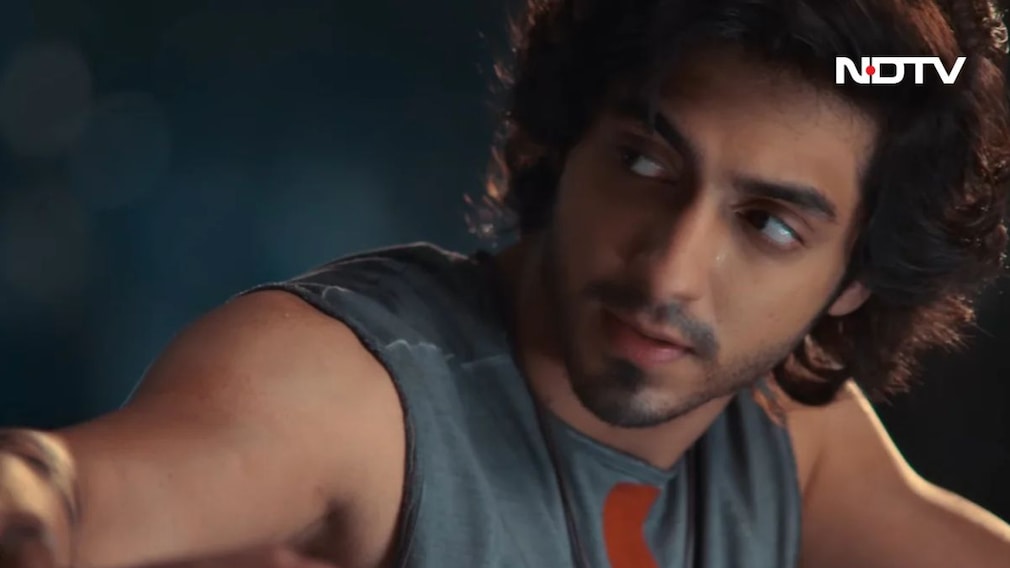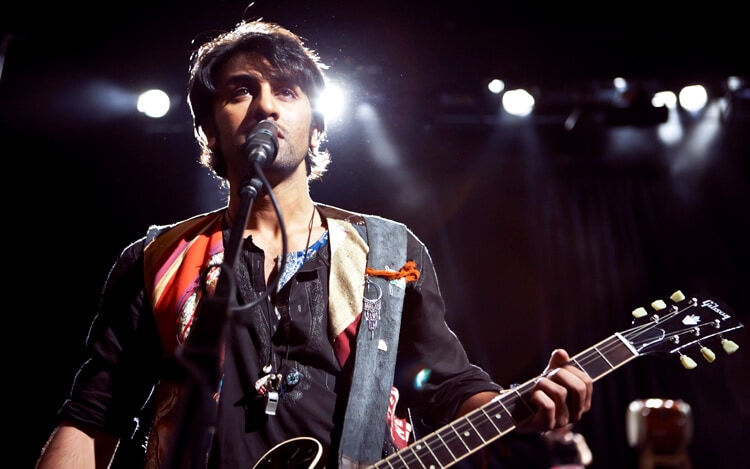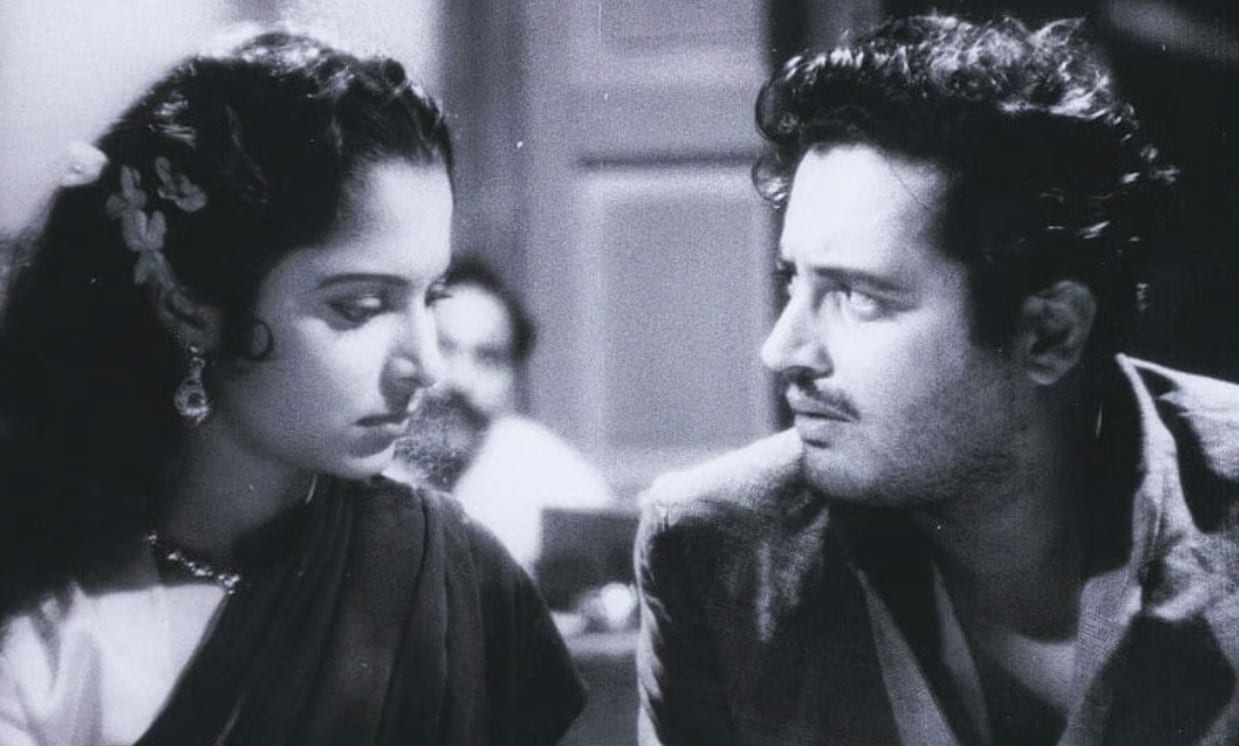Blog | Saiyaara, And The Taming Of The Tortured-Male-Rockstar
Mohit Suri's film flips the script, in that it allows the girl to bypass conventions and extract an Aditya Chopra hero, prone to seeing the divine in the person he loves, from Sandeep Reddy Vanga's universe of God-complexed lovers.

In Mohit Suri's Saiyaara, a bitter boy meets a guarded girl. He is hurting, and she is hurt. He, a singer, uses music to convey wounds, and she, a writer, uses words to cover injury. He seeks fame, and she wants solitude. As star-crossed as it comes, they are destined for a kind of love that consumes both but heals one; headed for a ruined romance where one survives and the other thrives.
Such stories have a precedent, comprising mostly a man at the centre - talented but obscure, wanting love but chasing heartbreak. The ache baptises him as an artist. Karan Johar's Ae Dil Hai Mushkil (2016) is a telling instance. Snubbed by the woman he loves, the man uses shards of his heart to make music, and earns success. This is such a trope that when the protagonist in Imtiaz Ali's Rockstar (2011) wishes to be a singer, he is prescribed heartbreak. Although Ali designs him as a reluctant rockstar willing to forsake everything for love, his hero eventually gains everything his heart desired at the cost of his heart.

Ranbir Kapoor as Janardhan Jakhar, or 'JJ', in Rockstar (2011)
This archetype of a tortured male artist is not a novelty in Hindi films. Guru Dutt's Pyaasa (1957), about a poet awaiting validation from a hostile world till he rejects all, is an early example. There are more, including Suri's own rendition of A Star Is Born in Aashiqui 2 (2013). Ali's Tamasha (2015) has a storyteller bleeding through the mundanity of life. In Abhishek Chaubey's Udta Punjab (2016), a biting take on Punjab's opium problem, the sole artist in the story is drug-addled.

Guru Dutt as Vijay, a tortured, struggling poet, and Waheeda Rahman as Gulabo in Pyaasa (1957)
If narratives confirm broken men as a prerequisite for artistry, they also carve specific roles for women to shoulder: the breaker or the healer. She propels the man to triumph or holds his hand through the turbulence of his making. Either way, she plays a part in someone else's journey and occupies limited space even as the succour demanded of her is boundless. She imprints the art, but the artist remains a man.
With Saiyaara, Suri updates the stereotypes.
Krish Kapoor (Ahaan Panday) is a volatile singer. Life has been unfair to him, and he, in turn, has little patience for fairness. His father is an alcoholic, and his band members, wealthier and better connected, get more recognition in the press. Always seething, he is introduced as beating up a journalist for favouritism. Standing on the other side of the scuffle is Vaani Batra (Aneet Padda), a girl so sensitive that she will probably crumble if pushed. Sparks fly.
This World Is A Tragedy
One would assume this is the story, that he is broken enough to be healed. But Krish, being a Mohit Suri hero, is scripted for graver tragedies. And thus it begins: Krish and Vaani gravitate towards each other. She pieces him together, and the colour of his t-shirts becomes lighter with his heart; a faint smile hovers over his lips. Everything fits: he is a narcissist, and she is devotional; she wishes for his success, and he wishes to be successful. Then disaster strikes, one primed to elevate Krish, but which will first crush him: Vaani is diagnosed with Alzheimer's. So far, so Rockstar.
On a trope-y level, the condition makes sense; as a metaphor, it works even better. Afflicted by a disorder that destroys memory, Vaani's fading into oblivion literalises the dispensable function women play in such narratives. But Suri flips the script. He uses the segue of sickness to craft a subversive coming-of-age story where gender roles are defined but not followed.
An Intervention
The swap happens gently, almost against the wishes of the leads. Till Saiyaara is predictable, the characters act derivative. Till the story is imitative, the ticks feel the same. Krish smokes like Kabir Singh, is called "animal" for his flying temper, and falls in love with the eagerness of Imtiaz Ali's heroes. Ditto for Vaani, who is content being a bystander to Krish's success. Yet, whenever they seek to assume these roles, Saiyaara uses the context of tragedy and intervenes. Moments before Krish's big concert, Vaani assures to be a cheerleader only to be disoriented; after Krish readies to go for his band's first concert tour, he runs back, an image that keeps repeating, from the airport to be next to her.

Aneet Padda as Vaani in Saiyaara
These deflections, slight on the surface, rework archaic optics. They allow the girl to bypass conventions and extract an Aditya Chopra hero, prone to seeing the divine in the person he loves, from Sandeep Reddy Vanga's universe of God-complexed protagonists. Saiyaara features a pliant female character whose path to healing assumes agency to be the central story, and a male artist willing to partake in it as the healer.
The Real Protagonist
Suri's filmmaking responds to this. Vaani might be lurking in the background, restricted to mostly reaction shots, but she is the protagonist. The camera is earlier established as her point of view; when she faints, the screen crumbles, and keeps finding her even when the stage is set for Krish. His big moments - a tour in India, a concert in London - keep getting interrupted by her condition. As if she is on the journey and he is playing catch-up. This thought gets reinforced when his acts, hitherto selfish, start being imbued with the care of service. He desires to flourish not for his sake but so that she can spot him from afar. Saiyaara, too, holds out, framing Krish as a rockstar, after teasing with the visual, only when the image pines with the purpose of finding her. So keen is he that grief of her absence, deployed by his predecessors as a license to be a man-child, is wielded by him to be tender, in preparation for a visit.
Such selflessness is atypical of an artist but typical of a lover. Perhaps this explains the allure of Saiyaara. Suri's film tempts with the familiar tale of a misunderstood singer to crack open as a tale of two star-crossed lovers who, altering destiny, head for a remedial romance. Both survive because the other survives. The artistry - she writes, he sings - becomes a means. Songs billow from broken hearts but not as a memento of a finished story, but as an accessory to keep sustaining it. Who knew the tortured male artist is just a simp in disguise?
(Ishita Sengupta is an independent film critic and culture writer from India. Her writing is informed by gender and pop culture and has appeared in The Indian Express, Hyperallergic, New Lines Magazine, etc.)
Disclaimer: These are the personal opinions of the author
-
Who Rules Under Oceans? US vs Russia Submarine Strength
As Russia and the US return to Cold War-era strategies amid rising tensions over trade and tariffs, here's a look at how they fare under the high seas.
-
Opinion | China, Now Trump: Pakistan And The Art Of Somehow Finding Patrons
Pakistan has successfully lobbied Western capitals into believing in its indispensability in the regional strategic landscape. The US continues to buy this narrative for various reasons, not discounting the naivete among them.
-
From Cow Dung To Cosmos: How India Gave The World Direct-To-Home Television
A collaboration between ISRO and NASA, SITE not only revolutionised rural education but also laid the foundation for what the world now knows as direct-to-home (DTH) TV.
-
Digital Fraud, Cybercriminals Stole Rs 23,000 Crore From Indians In 2024
Bank-related frauds have increased dramatically; the RBI reported a nearly eightfold jump in the first half of FY 2025/26 compared to the same period last year.
-
Opinion | A Rude Awakening For India: Navigating The Trumpian Tempest - By Shashi Tharoor
To simply buckle under US pressure would be a profound miscalculation for India, yielding not just economic ground but strategic dignity.
-
Opinion | Trump Tariffs: Diplomacy Is Dead. Long Live Social Media Theatrics
Trump's playbook is vintage. He first extends his hand as a friend, then strikes with the force of a bully. His tariffs are not about the principle of fairness. They are a blunt instrument wielded for selfish reasons, for dominance and spectacle.
-
Donald Trump Snubs India, Signs Oil Deal With Pak. What Does This Mean?
The US helping Pak is saying to India - 'toe the line or risk your enemy being strengthened upsetting a key ally (i.e., Washington) while you negotiate a trade deal'.
-
The Story Behind Donald Trump's 25% 'Reciprocal Tariff' On India
Mr Trump has reserved special 'praise' for India on tariffs, accusing it of charing unfairly high taxes on American goods imported into its markets.
-
Opinion | Trump Tariffs: The West Botched Up Russia ... And Now Wants India To Foot The Bill
The West has grudgingly recognised its inability to persuade India not to buy Russian oil. However, anti-Russian lobbies continue to apply pressure on New Delhi, seeing that their goal of imposing a strategic defeat on Russia has proved illusory.
-
Opinion | Lunch, Now A State Award: What's With The Growing Pakistan-US Lovefest?
After years of being ignored publicly by recent American administrations, the turnaround in established policy is baffling. What gives?










